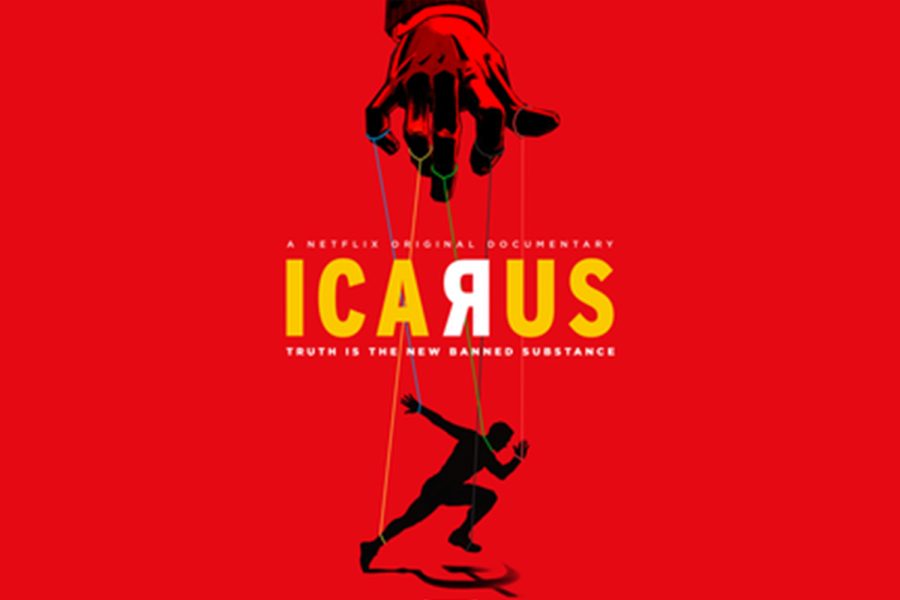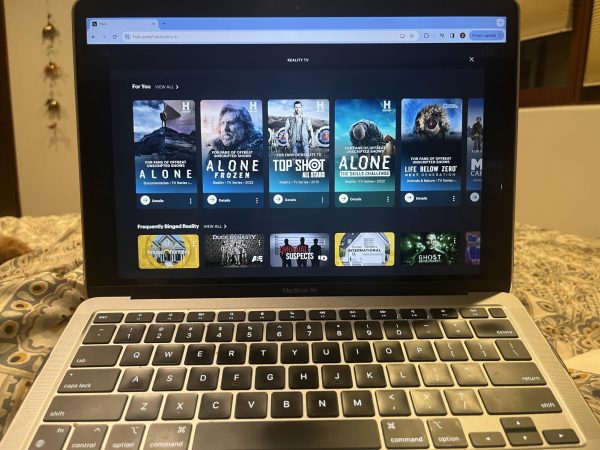Review: ‘Icarus’ transports viewers on unforeseen Russian geopolitical thriller
Photo credit: Netflix Promotional Photo
The Netflix film “Icarus” was released in 2017 and has since won an Academy Award. In this promotional photo, it is illustrated that the Russian government is controlling an Olympic runner, similar to a puppet. The Russian government asserts complete control over their athletes, and gives them little freedom.
March 12, 2022
In last month’s 2022 Beijing Winter Olympics, Russian skater Kamila Valieva received the top score of the women’s short skating program at just 15 years old. Four days later, she tested positive for trimetazidine, a banned performing-enhancing substance that aids the heart. Despite the rules that are established by the International Olympic Committee, the Court of Arbitration for Sport cleared Valieva to continue competing Feb. 14.
Valieva’s offense mirrors the 2014 Russian doping scandal when Russian athletes competed in the 2016 Rio Olympics despite the World Anti-Doping Agency uncovering their years of doping. Doping is when an administrator prescribes drugs to enhance sporting performance. The scandal was unintentionally captured by director Bryan Fogel, while he was shooting a documentary on Lance Armstrong and other athletes who were taking performing-enhancing drugs and passing drug tests. As an experiment, Fogel himself began doping to prove that he could cheat the poor drug-testing programs in place. To reveal the truth to the public, Fogel released the captivating film “Icarus” in January 2017.
The film starts with Fogel documenting his daily drug regimens and workouts in February 2014, when his only goal was to illegally place on the leaderboard of an amateur bike race in the French Alps: the Haute Route. Seeking professional help to not get caught during the race, Fogel connected with Grigory Rodchenkov, head of Russia’s national anti-doping laboratory, the Anti-Doping Center. Together, they developed a system that would result in a clean test and expose the ineffectiveness of athletic testing programs. What Fogel did not know was that since 2006, Rodchenkov had been helping Russia cheat in the Olympics through a state-sponsored athletic doping program.
Despite not placing in the Haute Route due to his bicycle malfunctioning, Fogel still crossed the finish line. Fogel himself stopped doping; however, he continued to film after Rodchenkov admitted to him Russia’s history of doping. As the Russian scandal began gaining attention in the media, WADA and the IOC launched investigations. Fogel’s unplanned friendship with Rodchenkov led him on a journey to expose the Olympic truth about doping while fleeing from the Russian government, who was trying to silence the pair from spreading the truth.
This spontaneous plot twist had me gasping. As the film shifted from a biking scam to two reporters on the run, I was shouting at the screen in disbelief. The diverse video elements including intimate vlogs, historical news clips, raw FaceTime footage and scene-setting B-roll created a piece of art documenting the ever-changing plot. Fogel recorded every event from front lines, and it was clear that he was unafraid to capture thrilling tapes of him and Rodchenkov hiding from Russian authorities.
Fogel interviewed relevant sources ranging from Olympic professionals to criminals on the run, which revealed deeper layers of the crime as the story advanced. Despite the intense politics in the film, Fogel created an artistic balance between world crisis and humor. Comical opera music layered the cheating and heists scenes, which humanized each character and made a connection to the audience’s lives. Rodchenkov’s dark humor and larger-than-life personality was hilarious, lightening each scene. His developing friendship with Fogel became brotherly, shown in clips that range from heartwarming birthdays to dismal late-night FaceTimes where they faced the unknown.
The documentary uses an organized layout to help viewers understand each event using timecards and relevant diagrams. The most shocking visual in the film was a map of the highly secured Moscow anti-doping lab, with a walkthrough of Rodchenkov’s exact route in his Russian heist to illegally replace the highly secured dirty Olympic urines with clean ones.
The Russian government threatened Rodchenkov’s life simply because of his knowledge about their doping crimes, and in response, he constantly quotes Orwell’s “1984,” saying, “truth is the banned substance.” The scandal uncovered a larger problem rooted in society: the lengths that powerful authority figures will go to in hopes of submerging the truth.
Since 2014, Russian athletes continue to compete in the Olympics, winning around 40 medals at each Olympic game. Through personal connections and appeals by powerful committees, such as the Russian Olympic Committee, Russian athletes attend the Olympic games under formalities. Fogel’s documentary leaves viewers with a question: Why are Russians still getting away with doping? In the most dangerous game in the history of sports, this suspenseful documentary has uncovered not just a scandal but the social truth: Big Brother can do whatever he wants.
-
Story
-
Narrative Flow
-
Technical Quality
-
Impact
Summary
“Icarus” tells the true story of the largest Russian sports scandal in history. Fogel originally intended to expose the ineffectiveness of the drug testing system for athletes, however, after enlisting the ex-head of Russia’s state anti-doping lab, he stumbled upon the 2014 Russian athletic doping scandal, and set off to expose the dark side of Olympic athletics. In 2018, “Icarus” won the Academy Award for Best Documentary Feature.





![Freshman Milan Earl and sophomore Lucy Kaplan sit with their grandparents at Archer’s annual Grandparents and Special Friends Day Friday, March 15. The event took place over three 75-minute sessions. “[I hope my grandparents] gain an understanding about what I do, Kaplan said, because I know they ask a lot of questions and can sort of see what I do in school and what the experience is like to be here.](https://archeroracle.org/wp-content/uploads/2024/03/grandparents-day-option-2-1200x800.jpg)





























































